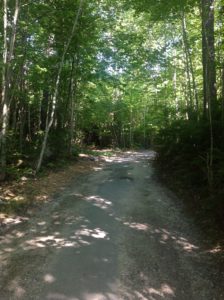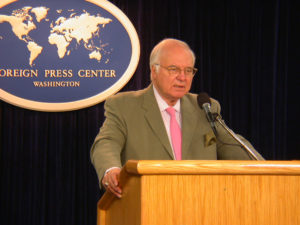 For Thomas Merton, nature is an icon, a window into God. In multifaceted ways, nature mirrors God’s Beauty. Nature is epiphanic; it comes from God, reflects God, and belongs to God. Nature is a sacrament of the presence and goodness of its Creator. According to Merton: “All creatures are like syllables in a song which God is singing. Everything that is is just a little syllable in this song which God is continually singing.”[1] By listening to the messages that created things convey by simply being themselves, one comes to know God a little better.
For Thomas Merton, nature is an icon, a window into God. In multifaceted ways, nature mirrors God’s Beauty. Nature is epiphanic; it comes from God, reflects God, and belongs to God. Nature is a sacrament of the presence and goodness of its Creator. According to Merton: “All creatures are like syllables in a song which God is singing. Everything that is is just a little syllable in this song which God is continually singing.”[1] By listening to the messages that created things convey by simply being themselves, one comes to know God a little better.
Merton, a lover of nature, believed that to awaken to nature is to awaken to God. Merton wrote: “The world is willed and held in being by God’s love and, therefore, infinitely precious in God’s sight.”[2] The most minuscule of creatures is important to God. Hence, according to Merton, “If you love God, you will respect God’s creatures.”[3]
Merton, who believed that silence and solitude are requisite for the prayerful consideration of nature, proclaimed: “Let me seek, then, the gift of silence and poverty, and solitude, where everything I touch is turned into prayer: where the sky is my prayer, the birds are my prayer, the wind in the trees is my prayer, for God is all in all.”[4]
In his life as a monk and, in the last few years of his life, as a hermit, Merton celebrated nature. He participated wholeheartedly in the rhythm and cadence of his natural surroundings. He experienced kinship with birds and deer and the woods and knobs that are all part of the bioregion called Gethsemani. Merton journaled: “I want not only to observe but to know living things, and this implies a dimension of primordial familiarity which is simple and primitive and religious and poor.”[5] Merton enjoyed taking dips in small lakes on the Abbey property and walking barefoot on blankets of pine needles in the woods of Gethsemani. Merton delighted in the dawn and, in self-forgetfulness, listened closely to choruses of croaking frogs. In a letter to Rosemary Radford Ruether, Merton noted: “One of the things I love about my life, and, therefore, one of the reasons why I would not change it for anything is the fact that I live in the woods and according to the tempo of the sun and moon and seasons in which it is naturally easy and possible to walk in God’s light, so to speak, in and through God’s creation.”[6]
Merton was an avid proponent of ecological conscience which is centered in an awareness of human beings’ true place as dependent members of the biotic community. Merton viewed sound environmental stewardship as an essential dimension of authentic Christian consciousness and commitment. He championed the absolute importance of cherishing and reverencing all things in their beingness. He wrote: “As we go about the world and everything we meet and everything we see and hear and touch, far from defiling, it purifies and plants in us something more of contemplation and heaven.”[7]
In 1968, in an address to a group assembled at Our Lady of the Redwoods Monastery in California, Merton issued a clarion call to his audience to participate in the festival of nature by joining in nature’s cosmic dance. He encouraged his listeners to “Drink it all in. Everything, the redwood forests, the sea, the sky, the waves, the birds, the sea-lions. It is in all this that you will find your answers.”[8] “Drink it all in” is exactly what Thomas Merton sought to do in the course of his own life.
In his poem “O Sweet Irrational Worship” Merton testifies to his experience of communion with nature: “I have become light/ Bird and wind/ My leaves sing/ I am earth, earth…”[9] Thomas Merton now plays in the New Eden, God’s Paradise that encompasses and goes beyond planet Earth and the Milky Way galaxy. Merton, the nature mystic, now dances with God in God’s cosmic universe and delights in joining with all those who celebrate God’s holy creation.
Sr. Marilyn Sunderman, RSM, Ph.D., is professor of theology and chair of the on-campus undergraduate theology program at Saint Joseph’s College.
[1] Thomas Merton, Tape 7: Life and Truth: The Merton Tapes located in the Thomas Merton Center, Bellarmine University, Louisville, Ky.
[2] Thomas Merton, Love and Living, Eds. Naomi Burton Stone and Brother Patrick Hart (New York: Harcourt Brace & Co., 1985) 159.
[3] Thomas Merton, The Secular Journal (New York: Dell Publishing Co., 1959) 13.
[4] Thomas Merton, Thoughts in Solitude (New York: The Noonday Press, Farrar Straus & Giroux, 1995) 194.
[5] Thomas Merton, A Search for Solitude: The Journals of Thomas Merton Vol. 3 1952 – 1960, Ed. Lawrence C. Cunningham (San Francisco: HarperSanFrancisco, 1996) 190.
[6]Thomas Merton, The Hidden Ground of Love, Ed. William H. Shannon (New York: Harcourt Brace Jovanovich, 1985) 502.
[7]Thomas Merton, Seeds of Contemplation (New York: New Directions, 1949) 22.
[8]Quoted in “Man of Prayer” by David Stendl Rast in Thomas Merton: A Monastic Tribute, Ed. Brother Patrick Hart (New York: Sheed & Ward, 1974) 80.
[9]Thomas Merton, The Collected Poems of Thomas Merton (New York: New Directions, 1977) 344.

